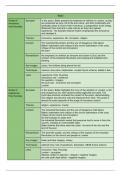Summary
Summary A* Romantic poetry notes
- Course
- Institution
The document has a detailed synopsis of each poem, the specific romantic context that links to them, the key themes and techniques and the other poems in the anthology they could link to.
[Show more]



